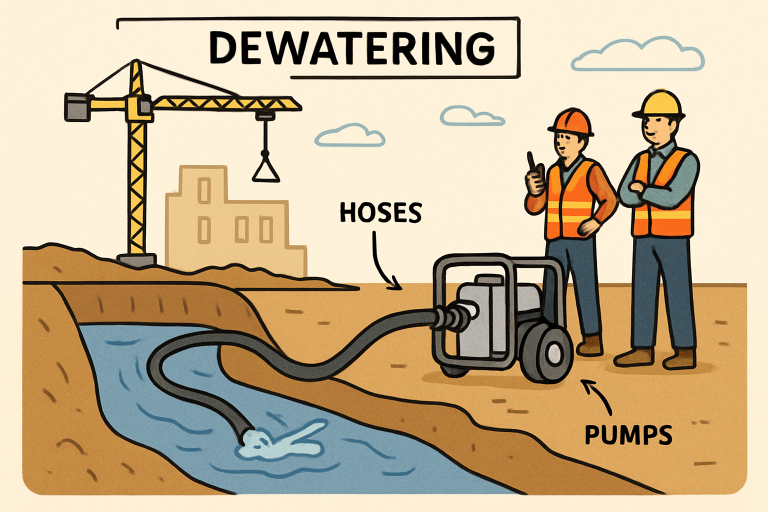Table of Contents
- Understanding Dewatering Services
- Advancements in Dewatering Equipment
- Strategic Partnerships Enhancing Service Delivery
- Customized Solutions for Complex Projects
- Comprehensive Rental Services
- Embracing Technological Innovations
- Conclusion
Understanding Dewatering Services
Dewatering plays a pivotal role in construction and environmental management by ensuring that excess water is effectively removed from soil or solid material. Without proper dewatering, construction sites risk delays, increased costs, and even hazards such as flooding and structural instability. One core aspect of these services is mechanical dewatering, which utilizes specialized equipment to separate water from solids, thereby improving both safety and efficiency on-site.
The rise in construction projects, urban development, and stringent environmental regulations has driven the need for more advanced dewatering solutions. These systems are no longer limited to traditional pumps; modern approaches integrate monitoring tools, automation, and environmentally friendly processes tailored to increasingly complex site requirements. Staying at the forefront of these services is essential, whether for small drilling projects, major civil works, or ongoing site maintenance.
Companies often rely on a combination of rental equipment and expert dewatering services to maintain site progress and avoid costly water-related issues. By leveraging short-term rental agreements, businesses can access the latest, most reliable equipment without incurring the expense of ownership, thereby enhancing both project flexibility and cost control.
Adopting a comprehensive approach—one that considers not just water removal, but also environmental stewardship and regulatory compliance—adds further value to dewatering operations.
Advancements in Dewatering Equipment
The evolution of dewatering equipment has been significant. Innovations such as adaptive mixers and high-efficiency pumps have revolutionized the management of water on construction and industrial sites. For example, the Flygt 4220 compact adaptive mixer, introduced by Xylem Rental Solutions, is specially designed for changing mixing conditions in wastewater treatment, boosting both productivity and operational flexibility.
Additionally, advanced sensors and remote monitoring systems now enable teams to make data-driven decisions in real-time, optimizing dewatering efficiency and minimizing downtime. As more intelligent automation and predictive analytics become standard, companies can better anticipate site needs, reduce manual labor, and improve safety.
Strategic Partnerships Enhancing Service Delivery
Strategic partnerships between equipment manufacturers and local service providers have expanded access to best-in-class equipment and knowledge. The recent alliance between Thompson Pump and Wagner Rents, as well as The Cat Rental Store, has expanded critical dewatering and bypass pump services across the Rocky Mountain region. By collaborating with trusted local suppliers, clients receive rapid support, tailored solutions, and minimized project interruptions.
These collaborations reflect a broader industry shift toward service-oriented business models, where equipment availability and technical support are bundled together for maximum client benefit. Companies gain more than just a rental—they access decades of expertise and a commitment to seamless project execution.
Customized Solutions for Complex Projects
Today’s construction and remediation sites often present unique dewatering challenges, ranging from fluctuating water flows to sensitive regulatory requirements. Tailored solutions are essential, particularly for high-stakes infrastructure or environmental projects. A major wastewater treatment upgrade in Kentucky, for example, required a temporary pumping system capable of handling between 7 and 14 million gallons per day over a full year of construction. This level of customization ensures vital operations are maintained uninterrupted.
By working closely with clients, dewatering providers can design and implement solutions that account for fluctuating site conditions, environmental protections, and evolving project scopes.
Comprehensive Rental Services
Dewatering is often only one element of an integrated rental services approach. Leading providers offer a range of additional tools, including air sparging systems, filtration units, and bioremediation equipment. These offerings not only help clients comply with environmental regulations but also streamline operations and reduce risk. Such end-to-end rental solutions minimize capital investment while supporting project scalability as needs fluctuate throughout a site’s lifecycle.
Businesses seeking to stay competitive leverage a wide range of rental solutions to maintain compliance and keep projects on track. For more on how these strategies are impacting the broader construction and utilities industry, see the coverage from Construction Dive.
Embracing Technological Innovations
Technology is transforming rentals and dewatering. United Rentals, for example, has introduced the EC-250 Mobile Treatment Trailer and the CL-250 Mobile Clarifier, both of which utilize advanced filtration and electrocoagulation technology to remove up to 99% of contaminants from wastewater—crucially, without the use of chemicals. This approach sets a new benchmark for sustainability and cost effectiveness.
The ability to rapidly deploy and scale such innovations means that even the most challenging job sites can benefit from cleaner, safer, and more environmentally responsible operations. Industry-wide, digital tracking, remote monitoring, and data-driven optimization are elevating the standards for what rental and dewatering services can accomplish.
Conclusion
The landscape of rental and dewatering services continues to evolve, driven by technological advancements, strategic partnerships, and customized, client-focused solutions. As the demand for reliable water management and equipment rental rises, embracing these innovations will be vital for industry professionals committed to operational excellence and regulatory compliance. Keeping pace with these trends ensures construction firms and environmental managers remain competitive, efficient, and sustainable.

